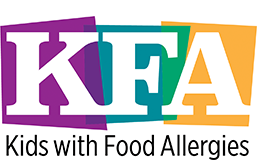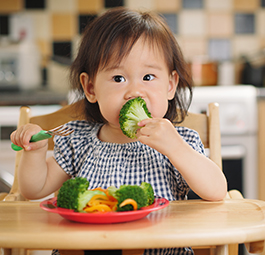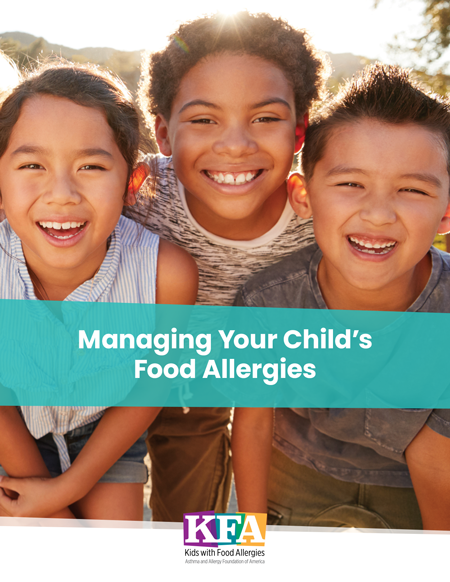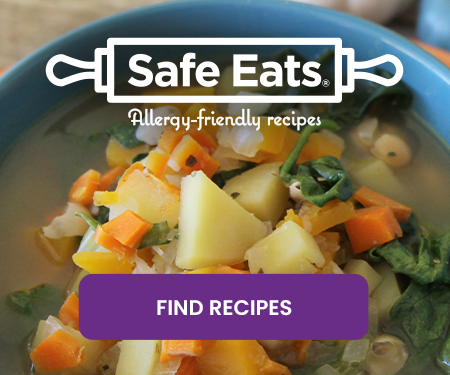Living with Food Allergies

Kosher Labeling and Food Allergies
Kosher foods are foods which meet Jewish dietary laws. If you are Jewish, you:
- Cannot eat certain foods
- Must prepare foods a certain way
- Cannot mix milk and meat products
Some people who manage a milk allergy use Kosher labels to tell if a food contains milk. But Kosher labeling is not an accurate way to figure out if a product is safe for someone with a milk allergy.
Closed
What Do Kosher Labeling Mean?
- In the Kosher system, foods are classified as being either “dairy,” “meat,” or “neutral” (neither dairy nor meat).
- Foods that meet the Kosher dietary laws are labeled with one of the Kosher symbols, including: K,
 , and
, and  . You can usually find these symbols in small type on the bottom front of the package.
. You can usually find these symbols in small type on the bottom front of the package.
- Kosher foods that contain milk products usually contain a “D” or the word “Dairy” after the Kosher symbol.
- Kosher foods that are processed on “dairy equipment” may have a “D” or “DE” after the Kosher symbol. From the food allergy perspective, these foods may be cross-contact with dairy ingredients. (“Dairy equipment” is equipment that is also used to process foods that contain milk or have been used in the past to process foods that contain milk and has not been cleaned according to Jewish law to remove the milk product.)
- Kosher foods that are considered neutral (not dairy or meat) have the word “Pareve” or “Parve” after the Kosher symbol. Note: under Kosher laws, fish is considered to be neutral.
- The letter “P” in Kosher labeling never denotes “Pareve.” “P” designates “Kosher for Passover” (a Jewish holiday that has its own dietary laws).
- Not all foods are Kosher, so not all foods have a Kosher label.
What Does “Kosher for Passover” Mean?
Passover is a Jewish holiday that is celebrated for seven or eight days in the spring. During Passover, Jews follow a second set of dietary laws. These laws are added on top of everyday kosher rules.
Under Passover dietary rules, you cannot cook with grains that can ferment and become leavened. These grains are wheat, barley, spelt, oats, and rye. During Passover, people can only eat unleavened grains.
Wheat flour is permitted only if it is baked into Matzah (unleavened bread). But you can grind the Matzah back up to create “Matzah meal” to use as an ingredient in something else. Because of this, foods that are Kosher for Passover may not be free of these grains.
Some special Passover foods are made without corn or soy. For some families managing these food allergies, Kosher for Passover foods may offer extra options.
You can buy Kosher for Passover foods in bulk and then freeze or store for use the rest of the year. Look for Passover foods to begin appearing in markets somewhere between February and mid-March. Kosher markets or a grocery store serving a large community of Jewish shoppers is the best place to find these items.
Some grocers stock Passover items for other Jewish holidays such as Rosh Hashanah, Yom Kippur, and Hanukkah. Rosh Hashanah and Yom Kippur are in September. Hanukkah occurs around December.
What Do I Need to Know About Kosher Labeling If I Have Food Allergies?
Here are some things to remember about Kosher foods if you have food allergies:
- You cannot use Kosher labeling to help you decide if a product safe for someone with a milk allergy. Some foods still may contain small amounts of milk or may come in contact with other foods that contain milk. Kosher labeling does not address cross-contamination issues.
- Kosher for Passover foods often contain eggs and nuts. In fact, eggs and nuts abound during Passover.
- If you do want to buy Kosher for Passover foods, shop early and go often because foods may sell out leading up to Passover.
- Do not confuse the “P” in kosher for Passover for “Parve” which means “neither meat nor milk.” For example, a product labeled OUP doesn’t mean “parve.” It means “for Passover consumption.” It still may contain milk.
- Parve foods are available year-round but may or may not be Kosher for Passover. Be careful when reading labels; some Kosher certifying agencies uses the symbol “P” as parve, not Passover, which be confusing.
- Many Kosher for Passover products contain potato derivatives. Potato derivatives include potato starch and/or potato syrup.
- As always, read every label every time.
What Foods Should I Stock Up on Before Passover?
Kosher for Passover foods that KFA members have found helpful include:
- Margarine (made without dairy, and soy and corn)
- Chocolate chips (made without milk or soy)
- Whipped topping (made without dairy, and soy and corn)
- Flavored syrups, including vanilla, chocolate black cherry, strawberry and raspberry (made without corn)
- Potato crisps
- Coating mix for baked chicken
- Bouillon
- Soup/dip mix
- Candy (made without corn)
- Bubble gum (made without corn)
- Marshmallows (made without corn and soy; but made with egg white or fish gelatin)
- Vanilla extract
- Fruit leather
- Ketchup
- Mayonnaise
- Olive oil cooking spray (made without soy lecithin)
- Soda (made without corn)
- Gelatin (made from egg or fish or non-animal-based vegan sources)
- Pudding mix
- Corned beef
- Pastrami
- Hot dogs (soy- free)
- Chocolate syrup (made without dairy, soy, and corn)
- Coca-Cola and other sodas (uses cane sugar and is made without corn)
- Fruit snacks
- Cottonseed oil
- Cake mixes (wheat-based cake mixes that are made without dairy and corn)
- Duck sauce
- Chocolate spread (made without dairy, and soy and corn)
- Artificial mustard (made without mustard seed)
- Frozen foods, like frozen latkes (potato pancakes) (made without dairy, soy, egg, and corn)
- Ice cream (dairy and non-dairy alternatives), sherbets and popsicles
Medical Review: February 2008. Updated May 2013.













